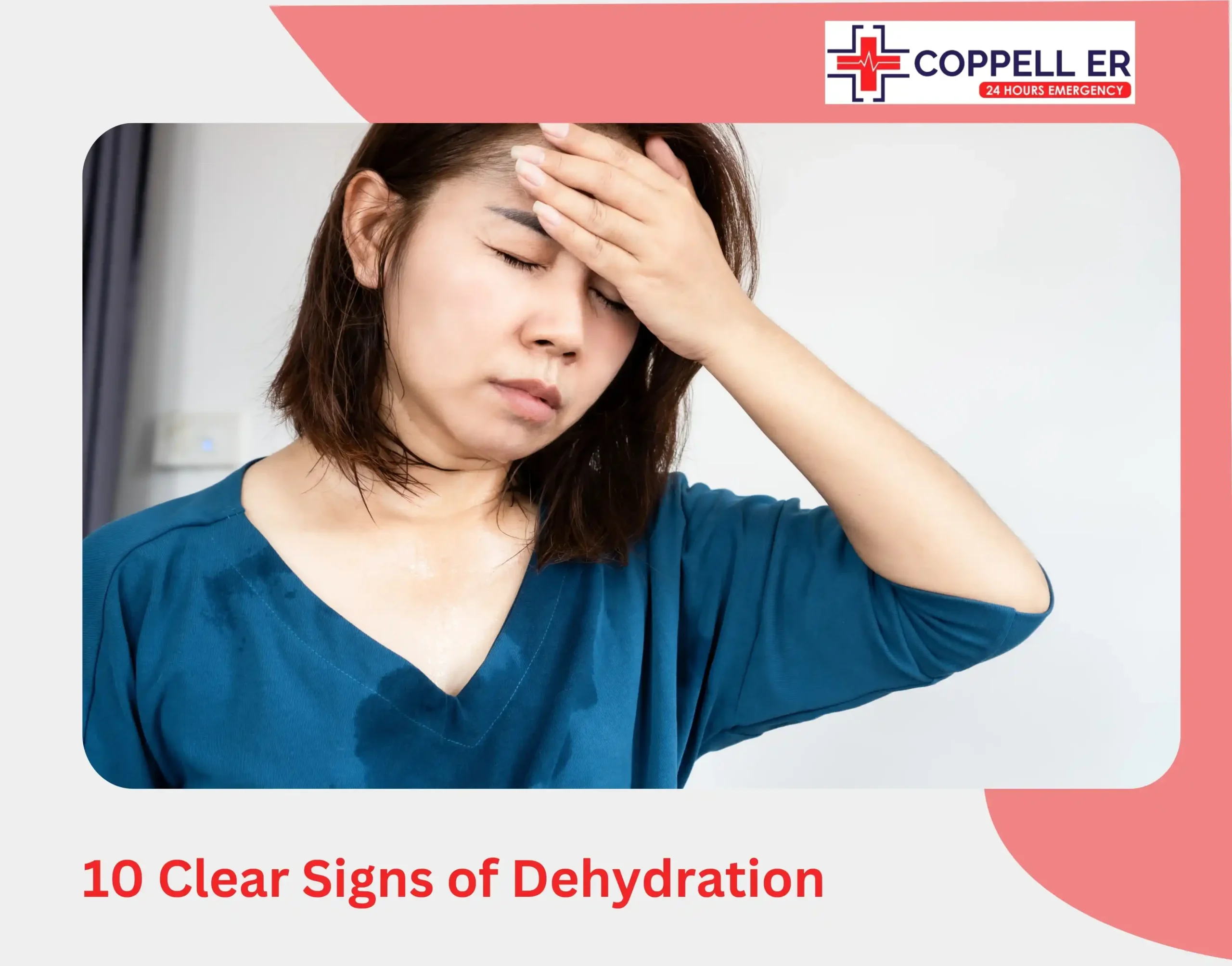Did you know that feeling thirsty is a late sign of dehydration? By the time you’re thirsty, your body’s already running low on the fluids it needs to function properly. But there are dehydration symptoms that show up before you feel thirsty.
The problem is, people often miss them. And since water makes up about 60% of your body, even a small drop in hydration can start to affect your vital organs performance. In some cases, it can become a life-threatening situation.
So let’s break it down. Here are 10 clear signs of dehydration you should never ignore, plus why they happen and when it’s time to seek medical help.
What is Dehydration?

Dehydration occurs when your body loses more water than it takes in. Water helps regulate your body temperature, keep your muscles moving, and maintain the health of your organs. When you don’t have enough water, your body can’t do these things properly.
You can lose water in many ways. This includes sweating a lot, being very active, or if you are sick with a fever, vomiting, or diarrhea. If you don’t drink enough water to replace what you lose, you become dehydrated.
If it gets worse, it can lead to acute kidney injury, organ failure, and shock. That is why it is essential to recognize the dehydration symptoms early and drink enough water daily.
10 Clear Signs of Dehydration You Should Never Ignore
Here are 10 common signs of dehydration to watch for:
1. Dark Yellow Urine
Healthy urine is usually light yellow. If it appears dark yellow or amber, your body is retaining water because you are dehydrated.
2. Fatigue or Weakness
Dehydration can leave you feeling tired or weak, even if you haven’t been physically active. Your body doesn’t have enough fluids to maintain energy levels.
3. Dizziness or Lightheadedness
If you feel dizzy or lightheaded, especially when standing up, it could mean your blood pressure is low due to dehydration.
4. Dry Mouth and Thirst
When your mouth feels dry and sticky, it’s your body’s way of telling you it needs water. Feeling thirsty is one of the early signs of dehydration.
5. Dry Skin
When you’re dehydrated, your skin can feel dry and less elastic. It may look dull and rough instead of smooth and healthy.
6. Headaches
A lack of water can cause headaches or make existing headaches worse. This happens because dehydration affects blood flow and pressure in your brain.
7. Rapid Heartbeat or Breathing
Your heart may beat faster, or you may breathe quickly, even when resting. This is your body’s way of trying to keep oxygen and blood flowing.
8. Confusion or Difficulty Concentrating
Your brain is about three-quarters water, so it’s no surprise it works best when you’re well-hydrated. Even mild dehydration (just 1–2% fluid loss) can cause noticeable dips in focus and memory, especially in older adults.
9. Sunken Eyes
Eyes may look tired, dull, or sunken when you don’t have enough fluids. This is a visible sign that your body is dehydrated.
10. Little or No Urine Output
If you haven’t urinated in a long time or only produce a few drops, your kidneys are trying to save water. This is a serious indication that requires prompt attention.
Common Causes of Dehydration
Dehydration can happen for many reasons. Here are some common causes:
- Hot Weather: When it is very hot, you sweat more. This makes your body lose water.
- Exercise: Engaging in physical activity, such as running or heavy labor, causes sweating and water loss.
- Illness: When you have a fever, diarrhea, or vomiting, your body loses water quickly.
- Not Drinking Enough Water: Sometimes, you may forget or feel too unwell to drink, which can lead to dehydration.
Knowing these causes can help you take steps to stay hydrated and safe.
How to Prevent Dehydration

Preventing dehydration is easier than treating it. Here are some simple tips to help you stay hydrated and healthy:
- Try to drink water throughout the day, even if you don’t feel thirsty.
- When it is hot outside, your body loses more water through sweat. Drink extra water to replace what you lose.
- If you are active or exercise, drink water before, during, and after your activity.
- If you have a fever, diarrhea, or vomiting, drink fluids often to replace what your body loses.
- Limit caffeine and alcohol, as these can make you lose more water.
- Fruits and vegetables like watermelon, cucumbers, and oranges help keep you hydrated.
When To Seek Emergency Care

Sometimes, dehydration can become very serious and require urgent care. If you or someone else shows any of these dehydration warning signs, go to the emergency room right away:
- Severe Confusion or Trouble Staying Awake: If you are very confused, can’t focus, or find it hard to wake up, this means the brain is not getting enough water.
- Fainting or Passing Out: If you faint or lose consciousness, it is a medical emergency.
- Very Little or No Urine for Many Hours: If you are not urinating or producing only a few drops for an extended period, the body is shutting down essential functions to conserve water.
- Rapid or Weak Pulse: When the heartbeat is very fast or weak, the body may need emergency treatment.
- Extreme Weakness or Dizziness: When it feels too weak to stand or continues to feel very dizzy, this is a serious sign.
- Cold, Clammy, or Bluish Skin: This can mean the body is struggling to supply blood and oxygen properly.
Final Thoughts
If you or someone around you has signs of dehydration and symptoms get worse, go to the nearest emergency room. Severe dehydration can be life-threatening, but a quick trip to the ER can reset how you feel in minutes.
The ER Coppell medical team is here 24/7 to get your body back in balance with IV fluids and electrolyte replacement. We also check if dehydration is caused by illness, infections, or heat exhaustion, and treat those problems. Stay hydrated, stay safe.
FAQs
1. Who is most at risk for dehydration?
Children, older adults, athletes, and people with illnesses that cause vomiting, diarrhea, or fever are at higher risk. Hot weather and heavy sweating increase the risk, too.
2. What should I drink if I’m dehydrated?
For mild dehydration, plain water usually works. If you’ve been sweating a lot or sick with vomiting or diarrhea, drinks with electrolytes (like oral rehydration solutions or sports drinks) help restore balance faster.
3. How much water should I drink each day?
A general rule is about 8 glasses (2 liters) a day, but needs vary. If you’re active, live in a hot climate, or are ill, you’ll need more. A quick check: if your urine is pale yellow, you’re likely hydrated.
4. Can coffee or tea dehydrate you?
Caffeine is a mild diuretic, meaning it can make you urinate more. But coffee and tea still count toward your daily fluid intake. The key is balance; too much caffeine without enough water can increase dehydration risk.
5. Can certain medications cause dehydration?
Yes. Diuretics (often prescribed for high blood pressure), laxatives, and some allergy or asthma medications can increase fluid loss. Always check with your doctor if you’re on regular medications.
6. Are children more likely to get dehydrated?
Yes. Kids lose water faster than adults. Since they can’t always tell when they’re thirsty, parents should watch for warning signs like less urination, dry lips, or unusual tiredness.
7. Do older adults feel thirst the same way younger people do?
No. As we age, the sense of thirst becomes weaker, so older adults may not realize they’re dehydrated until it’s severe. That’s why regular fluid intake is especially important for seniors.
8. How does dehydration affect athletes?
Even mild dehydration can hurt performance, slowing reaction time, causing cramps, and reducing endurance. That’s why athletes hydrate before, during, and after activity, not just when thirsty.




